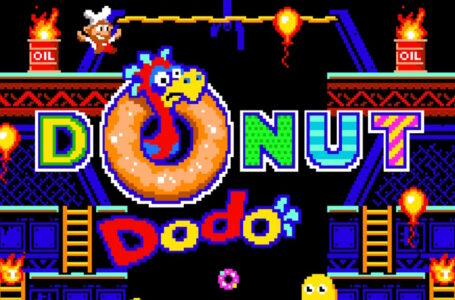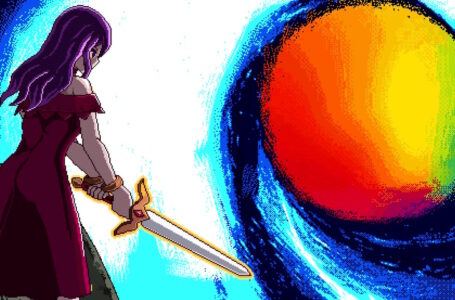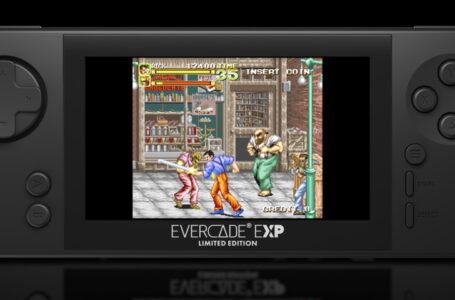Checking out Evercade’s new lineup of Japanese classics
The Evercade retro gaming platform is going from strength to strength. With a string of great cartridges already available and more gradually releasing over the rest of this year, the home console Evercade VS in November and the arrival of the long-requested arcade carts alongside it, it’s a great time to be a retro enthusiast interested in modern, officially licensed rereleases of classic games.
Even more so now that another Evercade cartridge of classics has been announced. Cartridge number 23, set to release in early 2022 with preorders opening in November 2021, is packed to the bring with 12 fantastic 16-bit games from Japanese publisher Telenet and its North American subsidiary Renovation.
Notably, the new Evercade collection consists of games that were never released in Europe during their original run, allowing European retro enthusiasts the opportunity to officially own copies of some fantastic titles for the first time — and picking up used copies of these specific games today will run you a small fortune.
So let’s take a closer look at each of the 12 games in this new collection to whet your appetites!
Arcus Odyssey
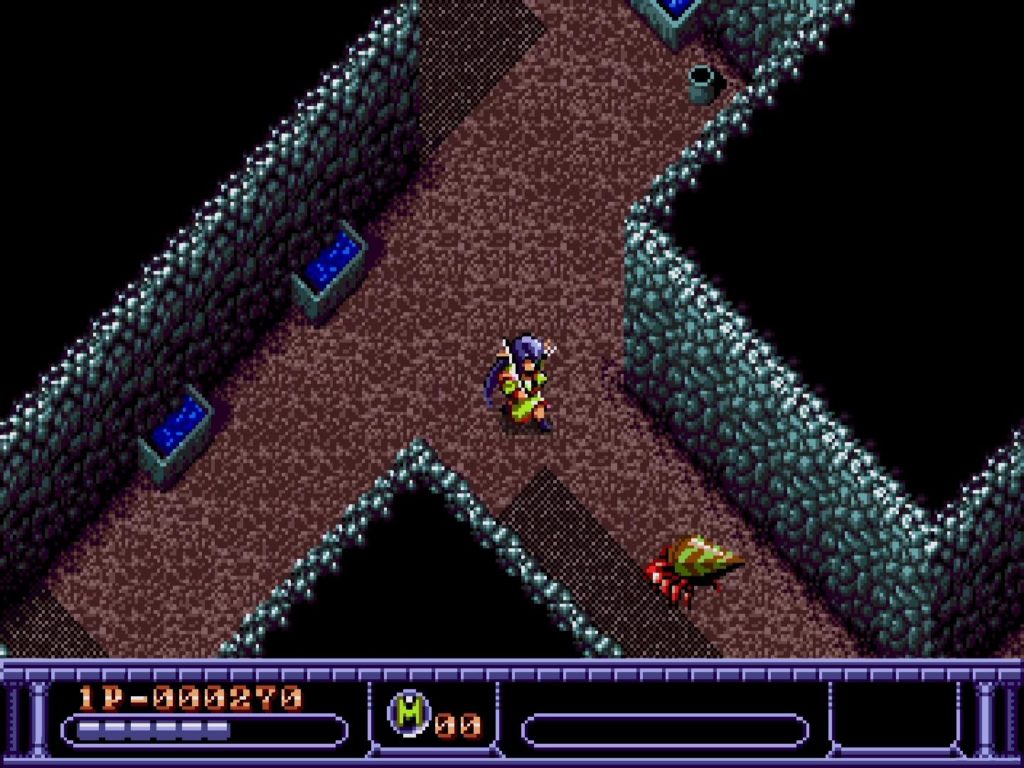
First released in 1991 for Sega Mega Drive and Sharp X68000 (with a Super Famicom port following in 1993), Arcus Odyssey is an isometric perspective action game developed by Wolf Team, better known in more recent years as Namco Tales Studio up until their merging with Bandai Namco proper in 2012.
In Arcus Odyssey, you (and optionally a friend) take on the role of one of four different characters in order to explore various levels and prevent a second coming of the dread sorceress Castomira. Gameplay-wise, Arcus Odyssey bears something of a resemblance to Atari Games’ Gauntlet with its labyrinthine levels and cooperative lightweight action RPG-style gameplay, but it has a little more depth; some levels require you to interact with allies or accomplish tasks other than simply finding the exit.
This is a speedy, challenging game with satisfying gameplay for either a single player or a cooperative duo, and the varied characters offer plenty of long-term interest. Plus it’s got some glorious ’90s pixel art anime visuals. Beautiful stuff.
Beast Wrestler
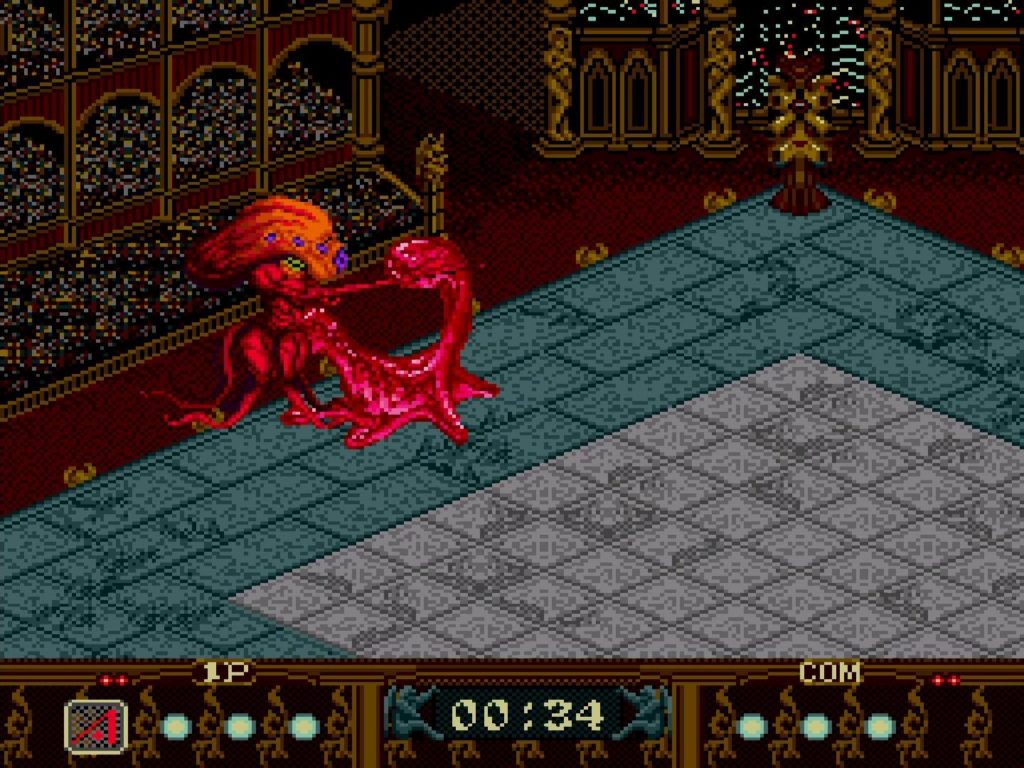
Beast Wrestler was developed for Sega Mega Drive by Riot (not the League of Legends developer) and published by Renovation in 1991. The game is an isometric perspective fighting game featuring a cast of beasts and dragons battling it out in the far-future sci-fi year of 2020.
As the name suggests, Beast Wrestler is less of a fast-action fighting game and more akin to a wrestling game — there’s a strong emphasis on using throws and choking attacks to incapacitate your opponent, and the electrified arena boundary allows for some creative takedowns — just the thing to reignite some old rivalries with friends thanks to the Evercade VS.
The single-player tournament mode features RPG-style elements where you can power up your dragon over the course of the game as a whole as well as uncover diskettes containing information about your potential opponents. You can even splice your DNA with that of your defeated enemies to learn new abilities!
Dino Land
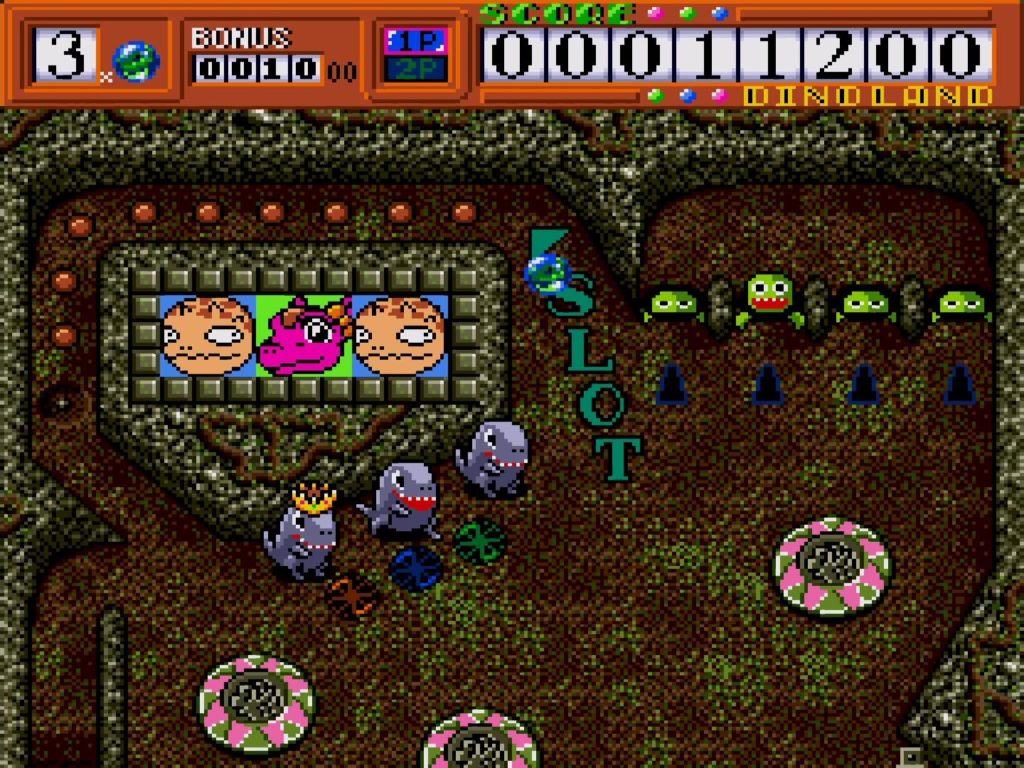
Another 1991 release by Renovation, Dino Land was developed by Wolf Team and released in North America and Japan for the Mega Drive.
I bet you were expecting a cutesy platformer with a name like “Dino Land”, weren’t you? Well, nope — it’s a pinball game, of all things, featuring a quest mode that tasks you with using pinball mechanics to rescue Dino-Mike’s girlfriend from the worlds of Land, Water and Air.
Like other video pinball titles from the early ’90s, Dino Land boasts multiple scrolling play areas with plenty of dynamic elements and secrets to discover — there are even boss fights to contend with as you work your way through the three “tables”, too. Definitely a fine fit for Evercade.
El Viento
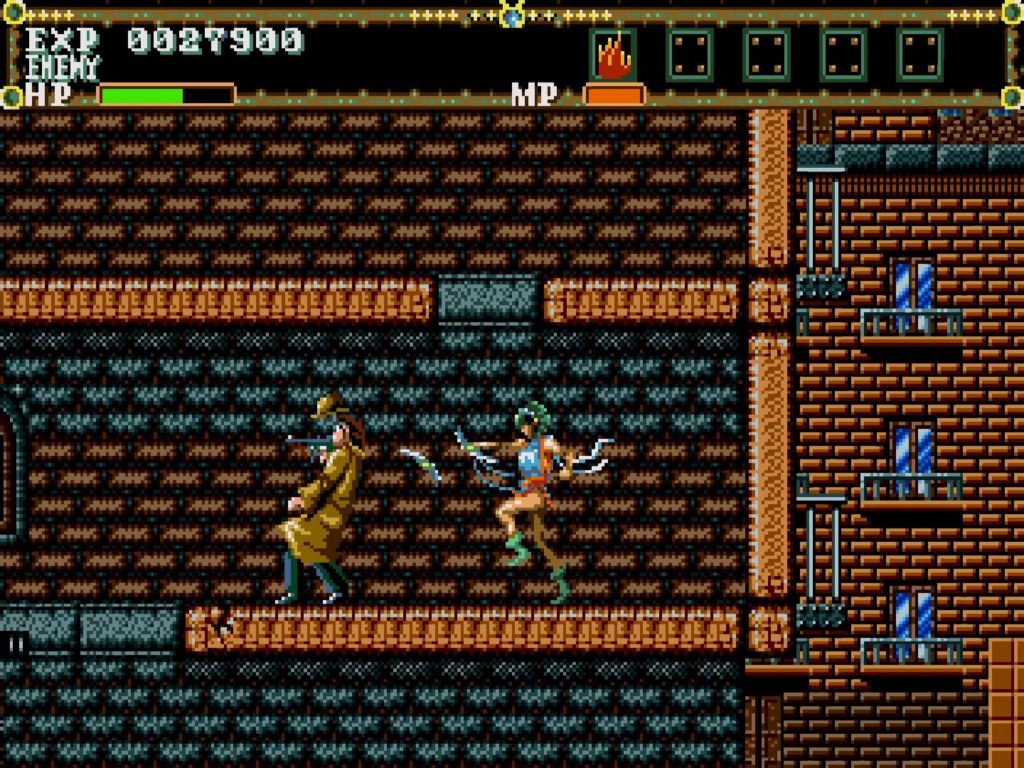
Another Wolf Team title for Mega Drive from 1991, El Viento is a platformer that forms the first part of a series that later included Earnest Evans and Anett Futatabi, the latter of which only ever came out in Japan. It features a 1920s New York City setting with strong influences from H.P. Lovecraft’s Cthulhu Mythos.
As the Peruvian sorceress Annet Myer, it’s your job to track down cult leader Henry, the notorious gangster Al Capone (renamed to Vincente DeMarcoto in the American version) and an evil sorceress named Restiana. They want to wake up the ancient god Hastur, you see, and however adorable he might have been in Haiyore! Nyaruko-san, in this instance that spells almost certain doom for the human race.
Game music fans will doubtless be interested in this one as an early example of a title scored by Motoi Sakuraba, of Tales and Star Ocean fame — but aside from that, it’s a solid, challenging and speedy action platformer that is commonly regarded as one of Wolf Team’s better games, and a welcome inclusion in this new Evercade collection.
Exile
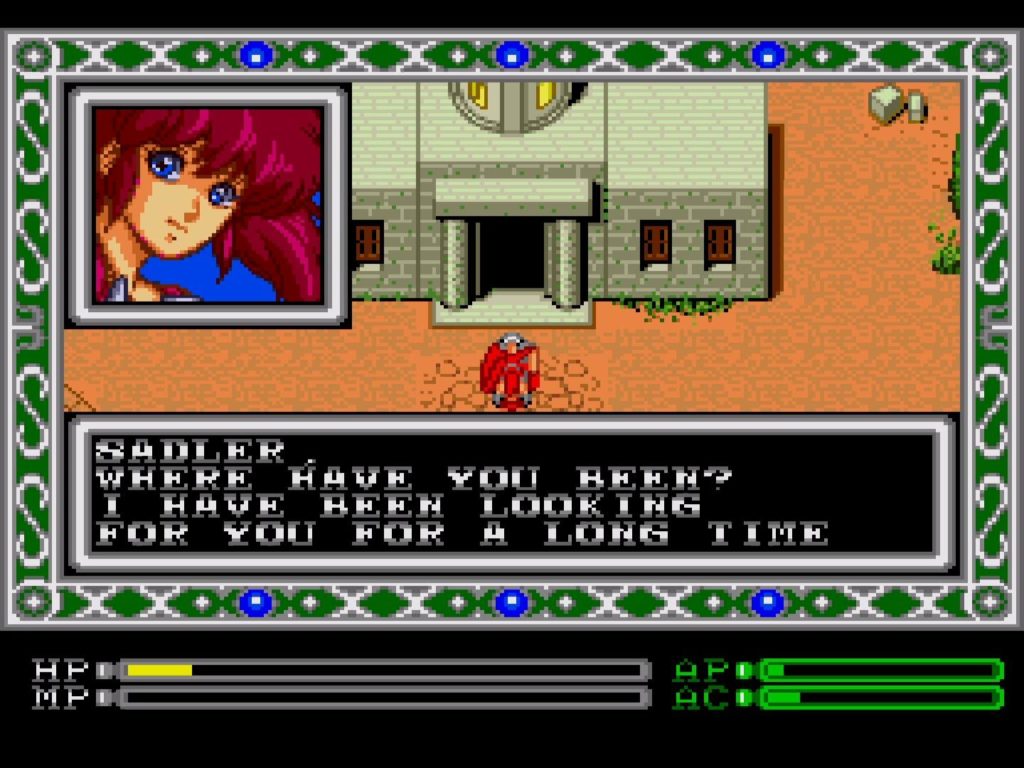
Exile, also known as XZR, is an action RPG that was originally released in Japan for NEC PC-88 and PC-98, MSX2 and X1 turbo. The second game in the series, which released in the same year as the first, was remade in 1991 for PC Engine and Mega Drive, and this is the version of Exile that came west. Since Working Designs handled the PC Engine version and Renovation took care of the Mega Drive version, it’s likely we’ll see the latter on the Evercade cart.
The original version of XZR II, as the sequel was known, features series protagonist and capital-A Assassin Sadler living in the time of the Christian crusades and slaughtering his way through several pantheons of gods in order to unite the world under one capital-G God and achieve world peace. The localised version toned down a lot of the more on-the-nose references to religion and world politics as well as scenes that were deemed “inappropriate” at the time — notably burning villages and naked women.
Interestingly, the localisation varied a bit between the PC Engine and Mega Drive version — NEC had particularly strict rules about referring to real-life religions, for example, so the Christian Crusaders became the Klispin Crusaders. That said, the PC Engine features a scene featuring a town of crucified heretics being burned alive, while this was cut from the Mega Drive version.
The game unfolds as a combination of top-down exploration and side-scrolling platformer — fans of Falcom’s Ys titles will doubtless be right at home, and it’s a delight to see more games like this on Evercade.
Final Zone
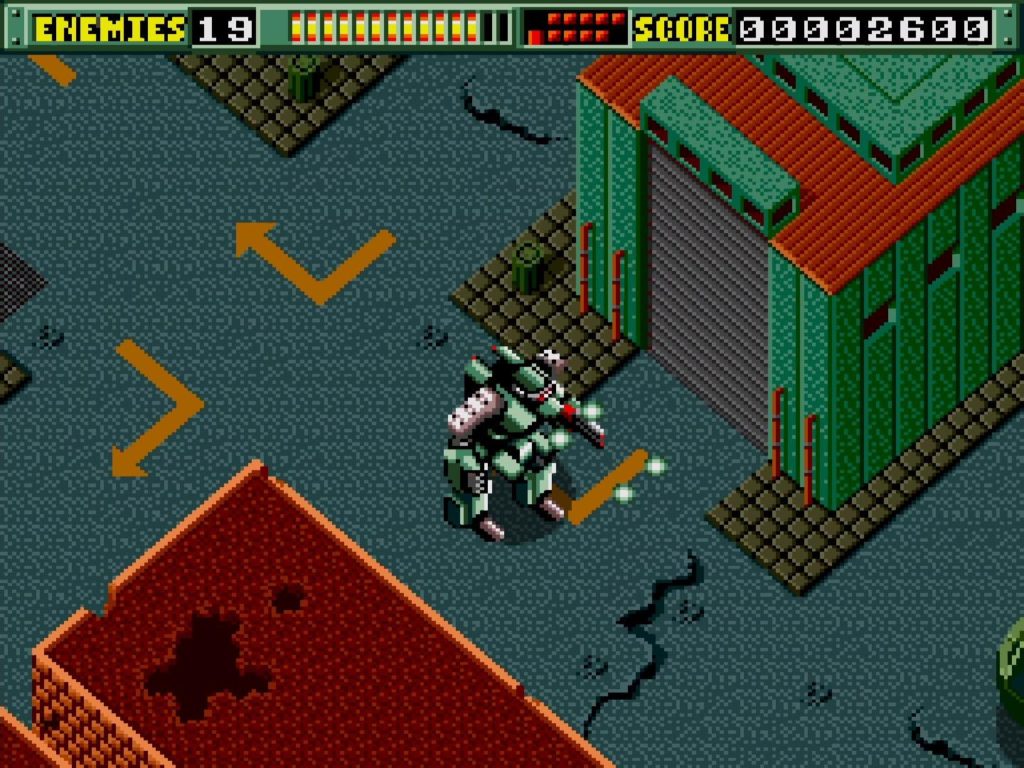
Final Zone, known as FZ Senki Axis in Japan, is a Wolf Team title from 1990. Taking on the role of Howard Bowie, commander of the unit known as Team Undead, it’s up to you to command your New Age Power Suit (or NAP) to destroy the last remaining weapon of mass destruction in the world.
Final Zone sets itself apart from some other shoot ’em ups through its interesting weapons system. It’s possible to collect a lot of weapons over the course of the game, but only two can be equipped and used at a time — the position in which they are mounted provides different variations on their attacks.
Unfolding across a series of isometric open world-style levels, it’s your job to track down the target enemies in each stage and blast them while ensuring your mech remains in good condition and well-stocked with enemies. Combat features the ability to “lock” your shooting direction while you hold the fire button down and strafe around enemies, plus plenty of variety in your various implements of death-dealing.
Gaiares
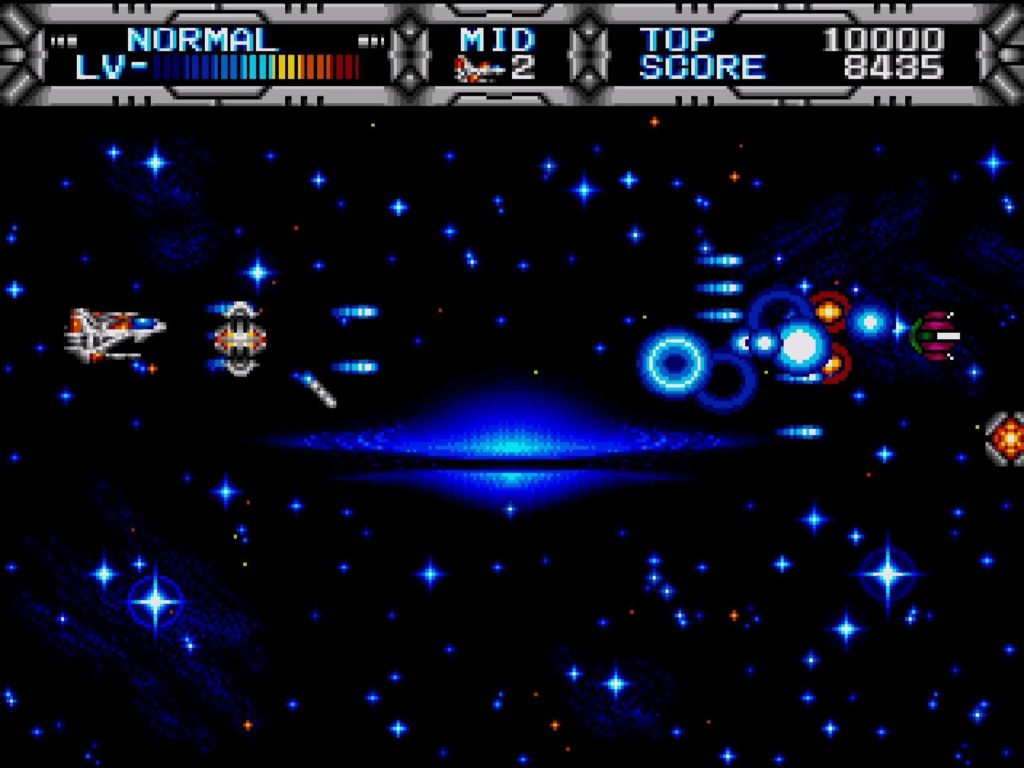
Gaiares is a widely beloved shoot ’em up from 1990 developed by Telenet Japan and published by Renovation for the Mega Drive. It was noteworthy for being one of the first 8-megabit games for the platform, and is looked back on very fondly as one of the better shoot ’em ups from the many available on Mega Drive.
In Gaiares, you take on the role of Dan Dare (probably not the one from The Eagle) as he pilots an experimental new star fighter in his attempt to fight the evil space pirates Gulfer. Its unique selling point is how you can shoot out your “TOZ System” companion drone to “capture” enemies and steal their weaponry; the game lacks a conventional power-up system, so this is your main means of arming yourself and buffing up your strength for the challenges ahead.
And there are plenty of challenges ahead; this is a tough game, but a rewarding one, featuring plenty of spectacular setpieces and some of the best shooting action from the 16-bit era. A welcome addition to the Evercade’s growing shoot ’em up library, for sure.
Granada
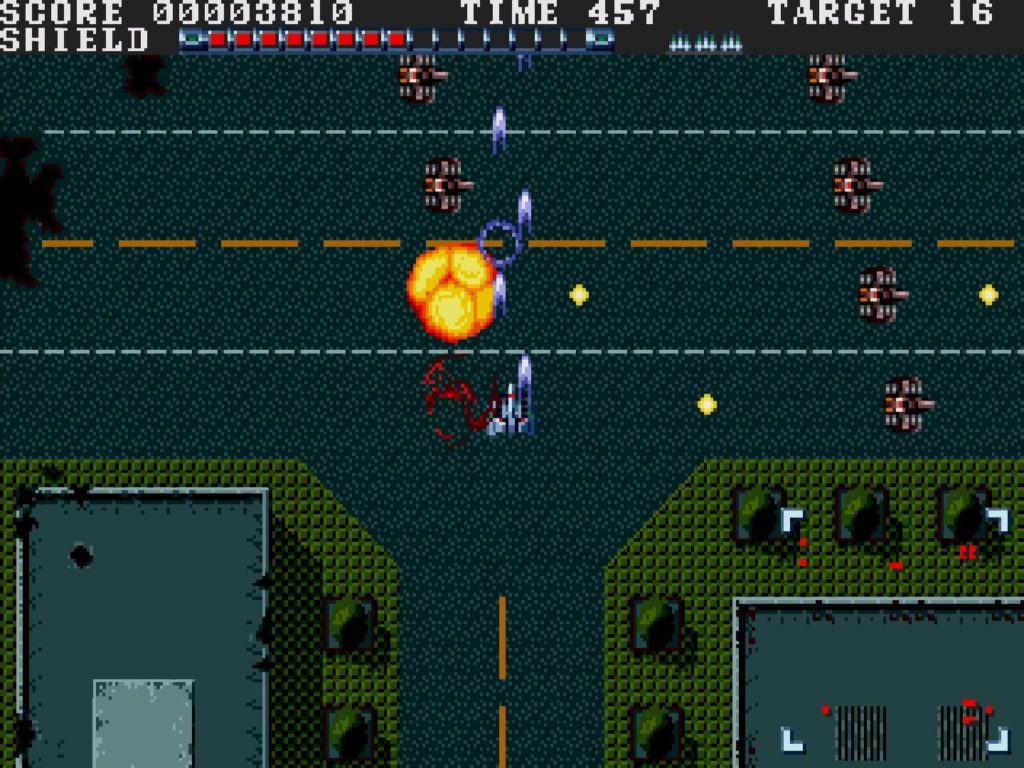
Originally developed exclusively for the Sharp X68000 home computer, Granada was Wolf Team’s first game to emphasise gameplay over plot. It first released in Japan in 1990 and was ported to Mega Drive later in the year.
The Mega Drive version (which is the one we’ll see on Evercade) features a few differences from the Sharp X6800 original; notably, it has a smaller colour palette and lacks introductory and intermission animation sequences. On the flip side, it runs at a better frame rate and has a completely new seventh level.
Like Final Zone, Granada is an exploration-based shoot ’em up in which you need to hunt down enemy installations and blast them; this time around, you’re piloting a space-age supertank known as Maneuver Cepter Granada from a top-down perspective. You can still lock your firing direction and “strafe” enemies, but in Granada you need to hold down a separate button to do this — it takes a bit of getting used to but once you get your head around it this game has a real “joy of movement” to it.
Sol-Deace
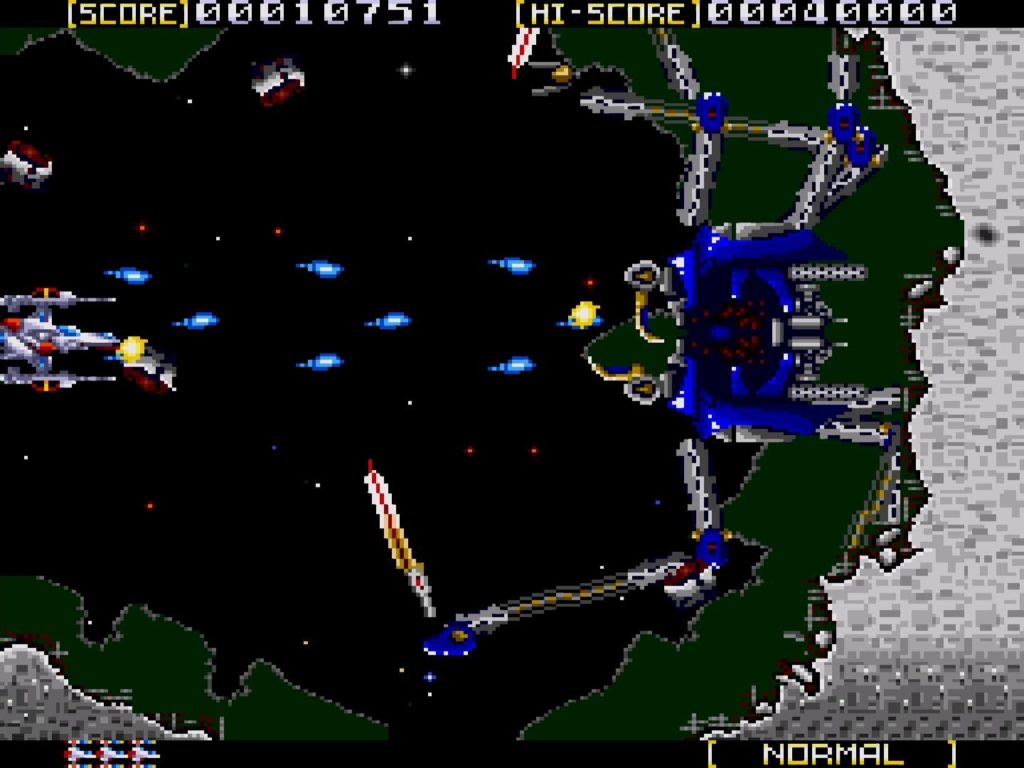
Originally known as Sol-Feace on its 1990 release for Sharp X68000 in Japan, Sol-Deace was subsequently ported to Sega Mega CD in 1991 and Mega Drive in 1992. It’s a horizontally scrolling shoot ’em up from Wolf Team, with its unique selling point being your ability to adjust your ship’s dual cannons to point in different directions.
Sol-Deace had mixed reviews on its original western release, with many critics regarding it as derivative and subpar compared to the many other shoot ’em ups around at the time. At least some of this negative reception can probably be attributed to genre burnout — the Mega Drive played host to a lot of shoot ’em ups and by 1992, reviewers had probably played most of them.
Looking back on it with the benefit of a modern perspective, Sol-Deace is an impressive shoot ’em up with some cool graphical effects, solid gameplay and admirably large sprites that the game doesn’t break a sweat flinging around the screen. Definitely a worthy shoot ’em up for those keen to get blasting on their Evercade.
Traysia
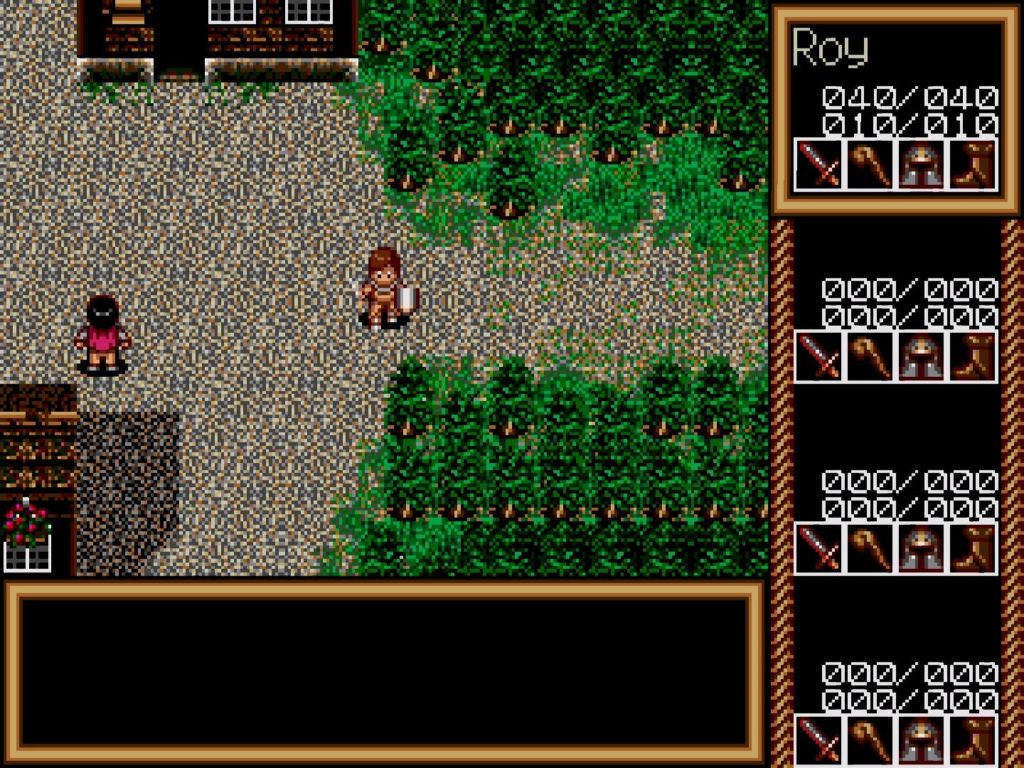
Evercade fans have been clamouring for more role-playing games on the platform since the interesting selection on the original Piko Interactive Collection 1 cartridge, and Traysia should certainly scratch that itch.
Originally released in 1992 for Mega Drive, Traysia casts players in the role of a young man named Roy who is keen to leave his hometown to explore faraway lands. Prior to him having the opportunity to do just that, Roy’s girlfriend Traysia gives him a pendant to remind him of her — given that the game is named after Traysia, one can expect that pendant to be a bit more important than a simple keepsake.
The game takes heavy cues from the Ultima games in terms of execution, so be prepared for an old-school sort of experience with this one — tactical combat and all. It’s rewarding, though — if you’ve been looking for something to keep you occupied for hours at a time on your Evercade, this one should keep you thoroughly busy!
Valis: The Fantasm Soldier
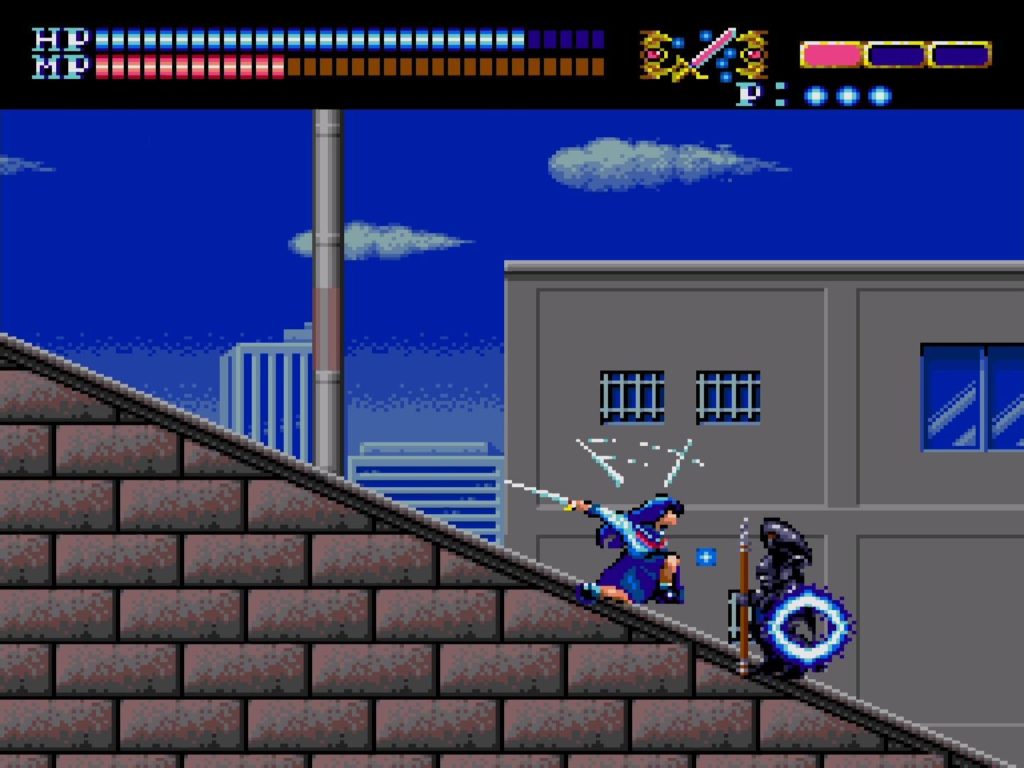
First released in 1986 for PC-88 and MSX home computers, Valis is probably Wolf Team’s most well-known franchise, for various reasons. It’s also had numerous remakes and reimaginings over the years, with the most well-known versions in the west being Riot’s Mega Drive and PC Engine Super CD-ROM versions; the former is the most likely one we’ll see on the Evercade collection, since that was the only one to get localised.
In Valis, you take on the role of a girl named Yuko, who wields the eponymous sword to protect the worlds of Earth, the land of spirits and the Dream World. The Mega Drive version unfolds as a side-scrolling platform game where our heroine can jump, slide, swing her sword and cast magic spells.
Valis has had a mixed reception over the years, with some of the various versions being considerably more fondly regarded than others. The PC Engine CD-ROM version is the clear favourite for its solid presentation — including voiced cutscenes — but the Mega Drive version is probably the most accessible, and would be very welcome on Evercade, for sure!
Valis III
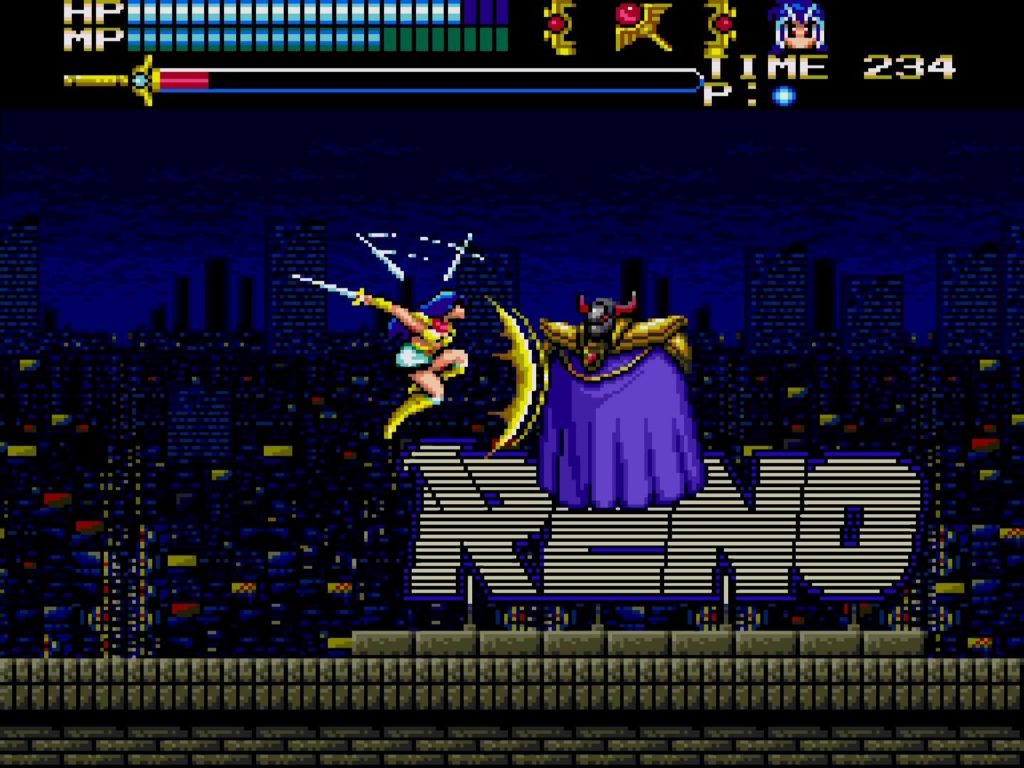
Valis III was first released for PC Engine Super CD-ROM in 1990, with a Mega Drive version following in 1991. Both of these actually got a North American release, so it remains to be seen which one we get on the Evercade cart; in keeping with the rest of this cart, likely the Mega Drive version.
This time around, protagonist Yuko is joined by her sister Valna and a young warrior named Cham, both of whom are playable characters. You can switch between the three heroes at any time, drawing inevitable comparisons to Konami’s Castlevania III: Dracula’s Curse. Each character can be upgraded independently, and defeating bosses with different characters results in different cutscenes — though most of the cutscenes were chopped out of the Mega Drive version, presumably to save cart space.
That said, the Mega Drive version does include a brand new level and improved boss fights, so each version has its own distinct benefits.
Unlike the mixed reception that the first Valis game had, Valis III had almost universal acclaim from reviewers at the time of its original release and remains fondly regarded as arguably the best installment in the series today. Definitely a game Evercade fans will very much appreciate having on hand and ready to go!
What do you think? Looking forward to any of these? Let us know in the comments below — or if you have more detailed thoughts, why not pen us a letter for the Rice Digital Friday Letters Page?
Join The Discussion
Rice Digital Discord
Rice Digital Twitter
Rice Digital Facebook
Or write us a letter for the Rice Digital Friday Letters Page by clicking here!
Disclosure: Some links in this article may be affiliate links, which means we may earn a small commission if you make a purchase after clicking on them. This is at no additional cost to you and helps support Rice Digital!
- Letter from the Editor: passing the torch - June 30, 2023
- Super Woden GP 2 is looking promising - June 30, 2023
- Inti Creates is making a 32 bit-style Love Live action platformer - June 26, 2023




